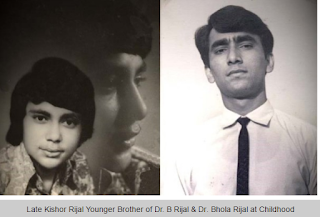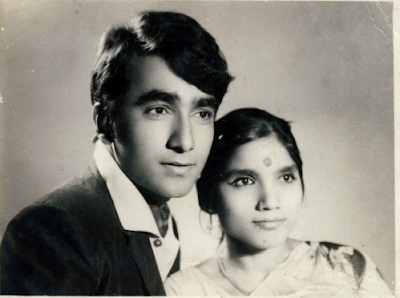कस्तो थियो त डाक्टर भोला रिजालको बाल्यकाल अनि कस रि बने डाक्टर : प्रत्यक मेडिकलप्रती चासो लिने बिद्यार्थीले सिक्नुपर्ने पाठ
Biography of Dr. Bhola Rijal
Dr Bhola Prasad Rijal is a preeminent Consultant Gynaecologist and Obstetrician in Nepal. Born in Dharan, the eastern hub of the country, in July 1948, Dr Rijal has pioneered In-vitro fertilization in Nepal a major treatment for infertility, thereby providing joy and hope for many couples. He is also the initiator for legalizing abortion in Nepal. Alongside his medical profession, Dr Rijal’s patriotism is reflected in his literatures and outstanding song writing ability, which has made him a renowned lyricists and singer in Nepal.
Early Life and Background
Dr Rijal is the son of a successful and educated landlord Janani Prasad Rijal and grandfather Dhurblal Rijal, who were also both lucrative poets and writers. His mother Purnamaya Devi Rijal, was an orphan whose lineage has been traced back to the “Luintel” family. To honour the family tradition, Dr Bhola Prasad Rijal was sent to the most prominent, highly regarded schools namely the Public High School in Dharan, AdarshaVidyalaya in Biratnagar, and later to Aadarsha Sewa Vidhyalaya in Varanasi India. He was married at the tender age of 15, to his ever-devoting wife, Sarala Ghimire when she was only 12 years old, in an arranged childhood marriage in accordance to the custom of the region. He then went onto gain his MBBS degree from Dhaka Medical College in Bangladesh in the year 1972. He returned to Nepal, as an eager newly qualified doctor and duly worked under His Majesty’s Government (HMG) in various hospitals around the country for about 7 years.
He decided to further his career and was keen to specialize in Gynaecology and Obstetrics, and returned to the University of Dhaka, Institute of Postgraduate Medicine and Research (IPGM &R) To complete his Postgraduate Diploma. He was awarded an Honorary Fellowship from the International College of Surgeons (FICS) and FRCOG from the Royal College of Thailand. In 1982 following his specialist training, he duly returned to Nepal to become the first practicing male gynaecologist, with the unsurpassable support and inspiration from his wife.
He decided to further his career and was keen to specialise in Gynaecology and Obstetrics, and returned to the University of Dhaka, Institute of Postgraduate Medicine and Research (IPGM & R) to complete his Postgraduate Diploma. He was awarded an Honorary Fellowship from the International College of Surgeons (FICS) and FRCOG from the Royal College of Thailand. In 1982 following his specialist training, he duly returned to Nepal to become the first practicing male gynaecologist, with the unsurpassable support and inspiration from his wife.
He lectured at the Institute of Medicine (IoM), Tribhuvan University Teaching Hospital (TUTH) the only teaching hospital in Kathmandu then. In recognition of his work he was promoted to Assistant Professor at the institute. He went to become an Associate Professor in Gynaecology and Obstetrics.
During this time, he also worked as a trainer in Laparoscopic Sterilization for the Nepal Family Planning Association, the most successful NGO in the country in the field of family planning, for almost six years.
From April to November 1987, he was the Assistant Dean at the IoM. During his tenure, Dr Rijal’s international and nationally acquired experience enabled him to promote a high quality of academia at the institute. Subsequently, in 1988, he was made the Medical Director of TUTH and remained in the position for two years. During this time, the TUTH was subject to many positive reforms. As a man who had experienced first-hand, the health conditions of rural Nepal,
Dr Rijal made sure that people visiting the hospital for care, especially the poor, were offered best possible
In 1990 private nursing homes and the private medical practice were slowly starting out in Kathmandu. (The country was also experiencing its first major peoples’ revolt.) There was also mounting protest against the monarchy reigned by King Birendra. The police were baton-charging protestors and bullets were being fired. Many injured people were seeking assistance from the TUTH. Despite being a government employee himself, Dr Rijal firmly believed that the Government should serve their people and not the other way around. Hence he supported the mass movement. Eventually, the citizens of the country were successful in bringing democracy to Nepal.
As a part of this democratic change in the country, TUTH started to see a serious debate over whether government doctors should be allowed to practice privately. People’s tendencies and trends of seeking services had changed and Dr Rijal felt that government hospitals alone could not serve the larger population. It was becoming evident that private facilities were more committed to quality health care. However, Dr Rijal was clear in his understanding. He believed that there should be no inequality between private and public health services, and in order to achieve this, doctors should be allowed to work consistently. He supported doctors to continue with Private services, as long as their private commitments did not impose upon the quality of care and services that they themselves provided in the government sector.
The Institution could not come to a mutual agreement, henceforth Dr Rijal and others of the same belief duly parted from TUTH. In retrospect, thirteen years later TUTH then recognized Dr Rijal’s healthcare vision and so resorted to allowing Doctors to practice privately alongside their government duties.
The brotherhood of man……..
People in Bangladesh respect and have the feeling of brotherhood for Nepalese people. Nepalese actively took part in their movement of freedom be it being a soldier or people who helped them giving them medical aid. I still remember me and my friends dragging bodies of injured to our hostel and taking out bullets from people who were injured. And in Bengal they used to call me dada and that’s great respect.
In media……
In 1969 director Gillani came to Kathmandu to open a radio station in Dhaka he had come to audition many. He came to auditioned Nepalese students residing in Dhaka for the radio, he selected me as a newsreader, commentary reader, and program organizer and in 1969 I started a Radio-Nepal in Dhaka, I taught many. My radio program also gave a platform to many big stars of today we were very close to them they used to sing my songs. When Narayan Gopal Dai and Nir Shah came here in 1971they meet me. I arranged there radio program and interviewed them. Narayan Gopal Dai’s song “Dherai Dherai bhul garechu zindagi payera mailai” was recorded here.
Starting work and then……………..










No comments:
Post a Comment